Trending Assets
Top investors this month
Trending Assets
Top investors this month
China's Belt & Road Initiative series (Part 2: Time will tell if it's economically viable or not)
If you haven't read Part 1, I recommend reading it before reading this memo.
Take the Gwadar port in Pakistan, for example. This port sits in a territory known for unrest. The area is poor, arid, and lacks drinking water and electricity. Even though this project lacks economic viability, China's government approved the financing and building of the port. Pakistan's main port city, Karachi, hosts the majority of shipping traffic to the country. Despite the lack of naval traffic going through Gwadar Port, China is able to import oil from the Middle East and bring it through Pakistan and into China through an overland route rather than through maritime routes, which can be prone to blockades, surrounded by naval mines, or even filled with naval ships in cases of war.
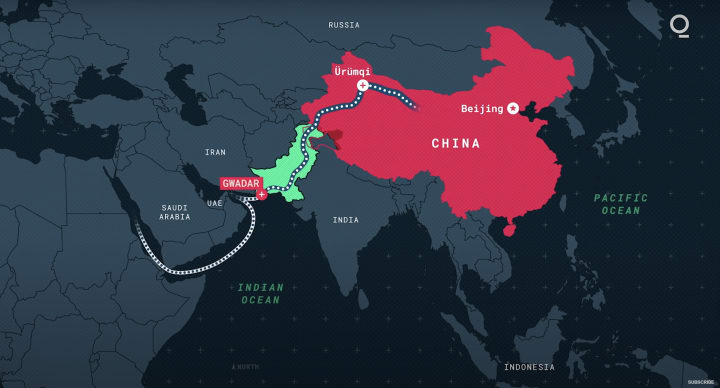
Make no mistake, the port construction in Gwadar is only one of many projects in Pakistan that are funded by China's government. Besides the port, China is also funding a series of highways, roads, bridges, and tunnels in Pakistan, and those routes will lead to China. The port is one-half of the overland route and the roads are the second half of the overland route. Where China and Pakistan border each other happens in the Xinjiang province, a place that use to host tons of unrest and now hosts some of the worst horrific human rights abuses in the modern day.
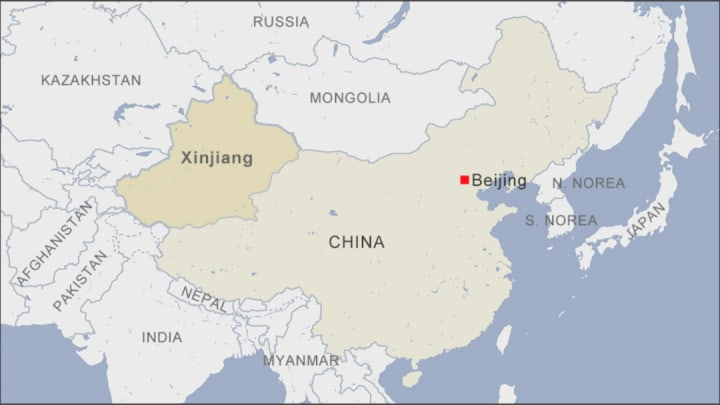
Besides Pakistan, Xinjiang borders Kazakhstan, which is another country that's part of China's Belt & Road Initiative. When compared to Gwadar, the railway project being built between Xinjiang and Kazakhstan has the worst economic viability among all the Belt & Road Initiative projects. That's because it sits at a Eurasian point of inaccessibility.
While that can be a curse from a commercialization standpoint, it can be a blessing as it would mean that it's impossible for any foreign enemies to sabotage infrastructure in that area.
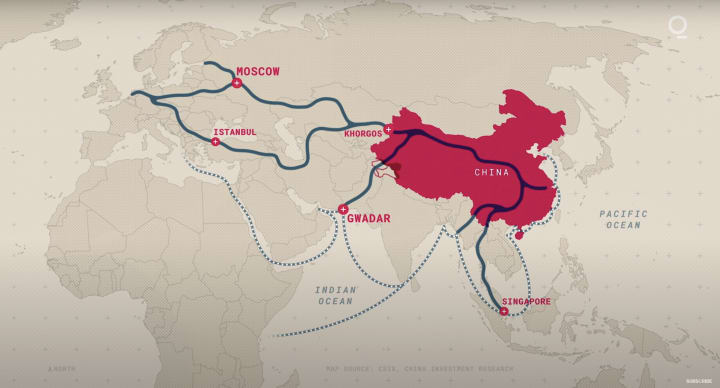
The overland route to Europe from China doesn't cater to much traffic. Firms that do use the route use it because the Chinese government offers generous incentives for anyone that uses the railway line. Otherwise, the majority of firms won't use it despite the generous subsidies.
There are issues with using the railway line and one of those issues is the different standards that different nations use for their rail tracks. While China and a couple of other nations use smaller and narrow train tracks, other nations use the older, wider Soviet-era train tracks. Shippers see their shipments stopping at a train station and their cargo gets transported onto another train to resume its journey to its destination. That's less efficient and takes longer than shipping goods along a maritime route.
Also, because China exports more than it imports, the majority of the railway traffic goes west and comes back empty. Without the generous subsidies that China's government offers, no one would be using the railway lines.
In a future part, we will go over why China would see such deals being profitable. For this memo, we need to acknowledge that China relies immensely on its relationship with Pakistan to ensure that its energy supply chains are safe. The US has been doing its best to get Pakistan to lean more toward them and less toward China. With the immense political and economic uncertainty in Pakistan, it's hard to tell whether Pakistan under the Sharif family will remain in power and keep Pakistan closer to the US or if the once-ousted populist leader Imran Khan will return to power and bring Pakistan closer to China and Russia. Pakistan's allegiance will determine whether blockading China during war will be proven effective or not.
Maybe the concerns of economic viability are overrated
There are many more projects within China's Belt & Road Initiative that encounter this fate, where the infrastructure is built and the usage of the infrastructure remains low. This has caused people to see these projects as "debt traps" and others became concerned that as those nations default on their debts, China will own pieces of their territory and turn those ports and other pieces of infrastructure into military outposts. Because many of the recipients of China's Belt & Road Initiative are poorer, some fear that those nations defaulting on their debts will cause a massive systemic collapse of the world economy. All of these concerns are unwarranted.
To address the issue of economic viability, consider the ghost cities that were once widely talked about in China. Zhengzhou is a famous example of a ghost city. What many don't know is that after a decade of being reported as a ghost city, Zhengzhou became a thriving urban center.
Zhengzhou went from being a ghost city to a thriving urban center because of policy support, rising incomes, and a growth in the number of people wanting to live in urban areas.
China's government approach to the buildout of cities is similar to its approach in the Belt & Road Initiative projects, where they build supply first and remain confident that demand will catch up. Like the Zhengzhou example, the demand takes time to catch up. And good thing the recipients of China's Belt & Road Initiative aren't at a huge risk of defaulting on their debts to China.
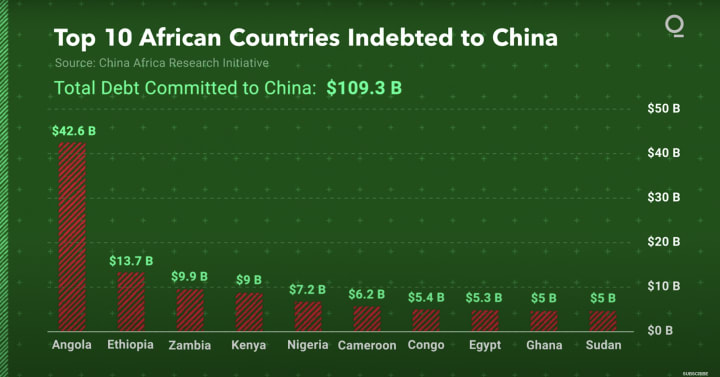
When looking at the amount of money that China has given to African nations, they amount in the billions. Angola has received the most money out of all the African nations. Interestingly, because of the huge sums of low-interest debt that Angola got from China, Angola was able to see its credit rating improve, and because of that, it was able to gain access to more lenders.
Most African countries owe most of their debt to China compared to other lenders. But in Asia, it's a different story. Take Sri Lanka, for example. China holds 10% of Sri Lanka's debt. Most of the debt is owed to various bondholders, the World Bank, Japan, and the Asian Development Bank.
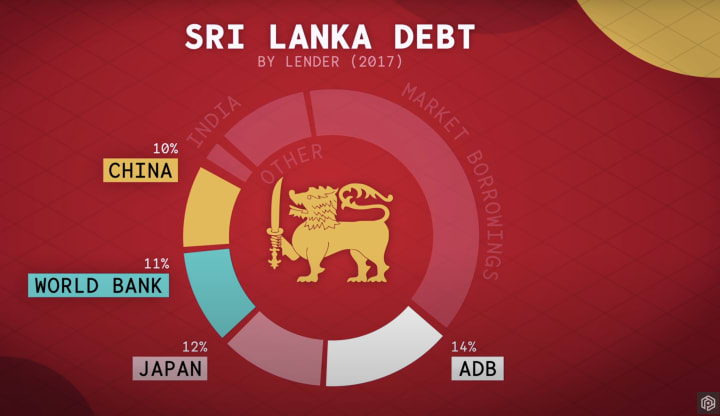
Also, China doesn't deliberately go after nations that have a high risk of defaulting on their debts. It avoids them. China doesn't push nations to join the Belt & Road Initiative, nations come to China for funding and construction. There are corruption and bribery scandals that come with some of these deals, but in the end, the deal usually continues.
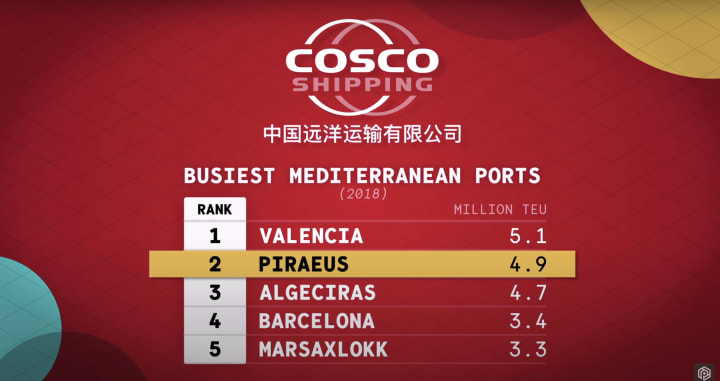
While there are a couple of deals within China's Belt & Road Initiative that have gone sour, there are a few that have been wildly successful. One of those deals is Greece's Piraeus port. Despite being only one of two bidders, Chinese state-owned shipping giant Cosco bought out the port and turned it into the second busiest Mediterranean port in 2018.
By turning an asset that went from looking highly unattractive and turning it into a high-performing asset, it's likely that we can be seeing similar stories happening as time goes on. And that's the big hope that China will see with its Belt & Road Initiative projects.
Takeaways:
- The allegiance of Pakistan will determine whether a naval blockade truly chokes China's economy or not.
- Looking at the example of Zhengzhou, a former ghost city turned thriving urban center, time will tell if these infrastructure projects are economically viable or not.
- One can learn from the ghost cities example that China prefers to build supply first and see demand come afterward than the usual method of providing supply only when there's demand
- China has proven itself to turn deals that look highly unattractive into attractive assets. Give these BRI projects time to show their economic viability.
- African nations are more indebted to China than Asian nations
- China isn't willing to do business with countries that are highly likely to default on their debts, which disproves the myth that the BRI is China's "debt trap" diplomacy tactic
YouTube
The Truth About China in Africa
The first 200 people get 20% off a year of Brilliant Premium: https://brilliant.org/PolymatterWatch this video ad-free on Nebula: https://nebula.tv/videos/po...
Already have an account?